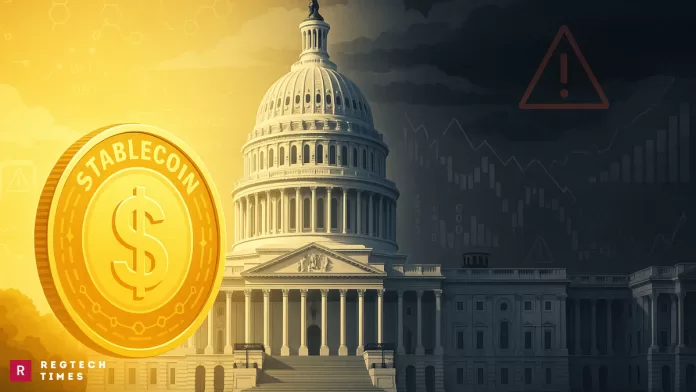The U.S. Senate has passed a new bill that could bring big changes to the world of cryptocurrency. It’s called the GENIUS Act, and it creates the first-ever federal rules for stablecoins — digital tokens that are supposed to stay equal in value to the U.S. dollar.
The bill passed with a strong 68–30 vote, showing support from both Republicans and Democrats. That means even though politicians often argue about a lot of things, many of them agreed that rules for stablecoins are urgently needed.
Stablecoins are popular in the crypto world because they help people move money fast without worrying about wild price changes. Unlike Bitcoin or other coins that can jump up or down, stablecoins are meant to stay steady — usually worth exactly $1. They’re backed by real money or safe financial assets, like short-term U.S. Treasury bonds.
Andrew Olmem, a former White House adviser, called the bill a “major milestone”. He said this is the first time the U.S. government has created a full system to control this fast-growing type of digital money.
What the Bill Will Do
The GENIUS Act sets strict rules for anyone who wants to create or sell stablecoins in the U.S. It says that each stablecoin must be backed by real, liquid assets — like actual dollars or short-term government bonds. That way, people using the coins know they’re safe.
The companies behind the coins also have to publicly share what’s backing their stablecoins every month. This makes things more open, so people can trust that the digital dollars are really covered by real money.
This has been a big request from crypto companies. For years, they’ve been asking lawmakers for a clear set of rules. They believe that regulation will make it easier for stablecoins to be used for everyday things — like sending money to family or paying for groceries.
The crypto industry even spent over $119 million during last year’s elections to support lawmakers who were in favor of digital money. Many of them hoped this would help make stablecoins a non-political issue, and the strong Senate vote shows they may be right.
Now, the bill goes to the House of Representatives, which is controlled by Republicans. If the House passes it, the bill will head to President Donald Trump, who is expected to sign it. Trump has shown strong support for the crypto industry, especially during his campaign.
Bo Hines, who leads Trump’s Council of Advisers on Digital Assets, said the White House wants to see this bill passed into law before August.
Big Concerns and Strong Opinions
Even with the strong vote, many people are not happy with everything in the bill. Critics say it doesn’t do enough to stop abuse, especially by powerful people close to President Trump.
Some are angry that lawmakers ignored Trump’s own involvement in crypto projects, like his meme coin $TRUMP, which was launched earlier this year. His family is also connected to a company called World Liberty Financial, which works in crypto. Critics say this is a serious conflict of interest. However, the White House says Trump’s assets are in a trust controlled by his children, so no laws are being broken.
Senator Elizabeth Warren was one of the loudest voices against the bill. She said it could help spread corruption and hurt national security. She also warned that it doesn’t stop big tech companies from creating their own stablecoins, which could give them too much control over digital money.
Others say the bill doesn’t include enough rules to stop money laundering or to block foreign companies from issuing stablecoins in the U.S.
State financial regulators also raised red flags. Brandon Milhorn, head of the Conference of State Bank Supervisors, said the bill gives too much power to some financial companies, especially ones that aren’t insured by the government. He warned this could hurt the safety of the entire financial system.
The House of Representatives may still change parts of the bill before it becomes law. But for now, the crypto world is watching closely, as this major step by the Senate could shape the future of stablecoins in America.
